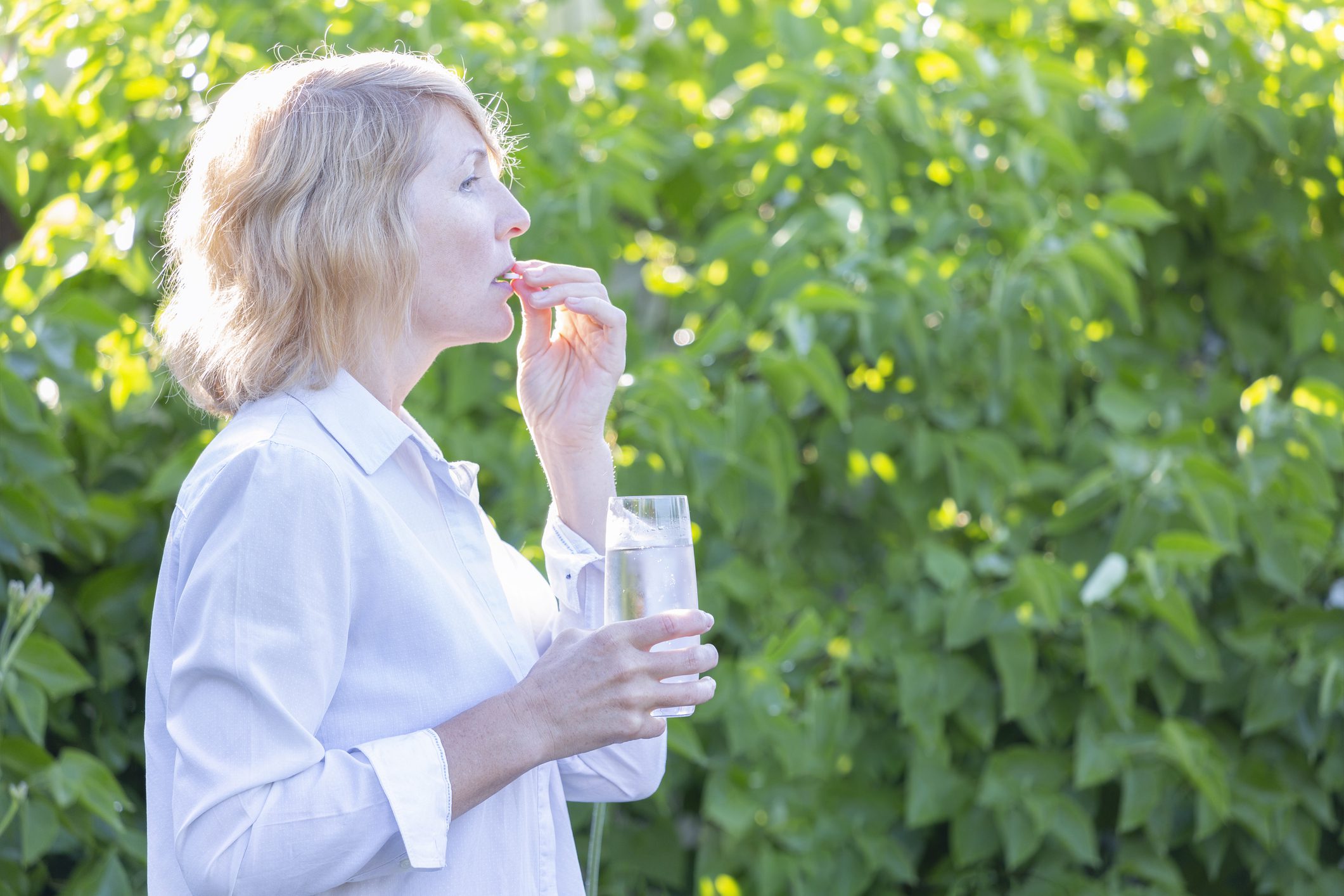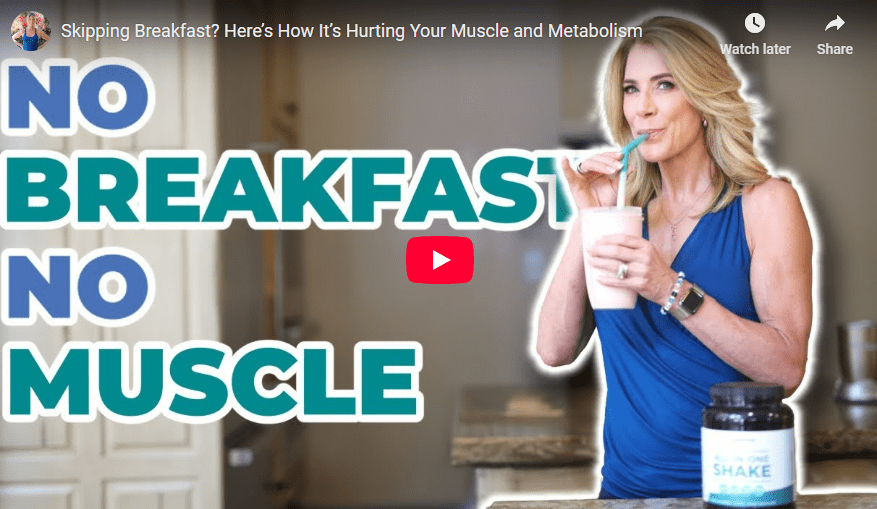Menopause is a transformative life phase that can be empowering and exciting. More often, however, hot flashes, mood swings, vaginal dryness, reduced libido, disrupted sleep, and weight fluctuations show up as obstacles during this life transition.
These symptoms frequently arise from hormonal imbalances that begin with the decline of progesterone. Subsequently, estrogen, testosterone, and DHEA levels fluctuate, contributing to various physical and emotional discomforts.
During my journey through menopause, I looked for practical solutions to manage these hormonal fluctuations and the associated symptoms. Incorporating a protein-first meal plan and resistance training helped tremendously. Meditation and quality sleep also proved invaluable for managing stress at this time, too.
Along the way, I uncovered a few scientifically-backed nutrients that helped me and numerous other women decrease and even eliminate symptoms, maintain energy and focus, manage a healthy weight, and reduce the risk of conditions like heart disease, which can become more prevalent during this phase.
These are the ones I found work best to help manage menopausal symptoms:
1. Diindolylmethane (DIM)
Supplementing with diindolylmethane (DIM), a compound found in cruciferous vegetables like broccoli and kale, can help balance estrogen levels. DIM does this by converting estrogen into “good” metabolites, which are safer and support a healthy estrogen balance.1
DIM may also inhibit the enzyme aromatase, which converts androgens (male hormones) into estrogens (female hormones). By inhibiting aromatase, DIM helps reduce overall estrogen production, which can be particularly beneficial in cases of estrogen dominance.2
One small study involving 19 post-menopausal women with early-stage breast cancer demonstrated that taking 108mg of DIM had a positive impact on estrogen levels compared to a placebo group.3
DIM also helps your body manage chronic inflammation, a factor indirectly influencing estrogen balance and contributing to menopause symptoms like hot flashes.4 DIM also supports your liver’s detoxification processes, helping you eliminate excess hormones, including estrogen.5
While cruciferous vegetables are important, you’ll need to supplement to get therapeutic levels of DIM. You’ll want to take 100-200 mg of DIM daily to get those amounts.
2. Coenzyme Q10 (CoQ10)
CoQ10 is a naturally occurring compound your body produces. A few foods, including organ meats and fatty fish, also provide this nutrient. However, these foods are not typically part of regular diets, making supplementation essential.
Menopause increases the risk of oxidative stress, where harmful free radicals overwhelm your body’s antioxidant defense system.6 If left unchecked, oxidative stress can contribute to various diseases, including cancer, cardiovascular disease, and neurodegenerative conditions.7
As an antioxidant, CoQ10 neutralizes free radicals, preventing their damaging effects. Additionally, CoQ10 enhances your immune system and supports mitochondria, the cellular powerhouses responsible for generating energy and boosting physical performance.8
Research indicates that many conditions, including brain-related diseases like dementia, diabetes, cancer, muscular disorders, and heart failure, are associated with lower circulating levels of CoQ10.9
Supplementation with CoQ10 can provide significant benefits for these and other conditions. Among them, CoQ10 helps:
- Protect brain cells from oxidative damage and supporting overall brain health10
- Improve insulin sensitivity and manage blood-sugar levels11
- Reduce free-radical damage, which contributes to various diseases12
- Enhance muscle function and energy production, reducing fatigue13
- Improve energy production in cardiac cells, supporting heart health14
CoQ10 exists in two primary forms: ubiquinone and ubiquinol, with ubiquinol being the active form. While ubiquinol is generally considered more bioavailable, there are concerns about its stability, as it can oxidize more rapidly when exposed to air and light. In contrast, ubiquinone is more stable, making it a preferred choice for CoQ10 supplementation.15
3. Tocotrienols with Geranylgeraniol (GG)
Vitamin E contains two “families,” known as tocopherols and tocotrienols. While vitamin-E-rich foods like almonds contain both, research suggests that supplementing with tocotrienols alone offers unique benefits for people navigating menopause, particularly in managing inflammation.16
Animal studies have indicated that tocotrienols enhance insulin sensitivity, lower dangerous triglyceride levels, and help reduce body fat.17, 18 Tocotrienols, especially delta-tocotrienol, possess significant antioxidant properties and can reduce oxidative stress effectively.19
These attributes make tocotrienols valuable for heart health. Heart disease is the leading cause of death among women and the risk increases during menopause.20 Studies also find tocotrienol supplementation can significantly reduce total cholesterol, LDL (commonly called “bad” cholesterol), triglycerides, and inflammation associated with cardiovascular disease in people with unhealthy cholesterol levels.21
Tocotrienols offer bone support as well. Research involving post-menopausal women with osteopenia or bone loss demonstrated that tocotrienol supplementation over 12 weeks improved bone health.22
The richest source of naturally occurring tocotrienols is annatto, derived from the seed or extract of the achiote tree. Additionally, the compound geranylgeraniol (GG), found in annatto, provides supportive benefits during menopause.23 GG aids in building and maintaining muscle mass, particularly in older people.24 This compound also supports hormone balance by enhancing testosterone and progesterone levels.25
References:
- Dr. Jolene Brighten: DIM Supplement Benefits For Women
- Dalessandri KM, Firestone GL, Fitch MD, Bradlow HL, Bjeldanes LF. Pilot study: effect of 3,3′-diindolylmethane supplements on urinary hormone metabolites in postmenopausal women with a history of early-stage breast cancer. Nutr Cancer. 2004;50(2):161-7. doi: 10.1207/s15327914nc5002_5. PMID: 15623462.
- Fernandez-Colorado CP, Cammayo PLT, Flores RA, Nguyen BT, Kim WH, Kim S, Lillehoj HS, Min W. Anti-inflammatory activity of diindolylmethane alleviates Riemerella anatipestifer infection in ducks. PLoS One. 2020 Nov 11;15(11):e0242198. doi: 10.1371/journal.pone.0242198. PMID: 33175869; PMCID: PMC7657562.
- Wang SQ, Cheng LS, Liu Y, Wang JY, Jiang W. Indole-3-Carbinol (I3C) and its Major Derivatives: Their Pharmacokinetics and Important Roles in Hepatic Protection. Curr Drug Metab. 2016;17(4):401-9. doi: 10.2174/1389200217666151210125105. PMID: 26651978.
- Sánchez-Rodríguez MA, Zacarías-Flores M, Arronte-Rosales A, Correa-Muñoz E, Mendoza-Núñez VM. Menopause as risk factor for oxidative stress. Menopause. 2012 Mar;19(3):361-7. doi: 10.1097/gme.0b013e318229977d. PMID: 21971210.
- Liguori I, Russo G, Curcio F, Bulli G, Aran L, Della-Morte D, Gargiulo G, Testa G, Cacciatore F, Bonaduce D, Abete P. Oxidative stress, aging, and diseases. Clin Interv Aging. 2018 Apr 26;13:757-772. doi: 10.2147/CIA.S158513. PMID: 29731617; PMCID: PMC5927356.
- Saini R. Coenzyme Q10: The essential nutrient. J Pharm Bioallied Sci. 2011 Jul;3(3):466-7. doi: 10.4103/0975-7406.84471. PMID: 21966175; PMCID: PMC3178961.
- Sood B, Keenaghan M. Coenzyme Q10. [Updated 2022 Jan 19]. In: StatPearls [Internet]. Treasure Island (FL): StatPearls Publishing; 2022 Jan-. Available from: https://www.ncbi.nlm.nih.gov/books/NBK531491/
- Mantle D, Heaton RA, Hargreaves IP. Coenzyme Q10, Ageing and the Nervous System: An Overview. Antioxidants (Basel). 2021 Dec 21;11(1):2. doi: 10.3390/antiox11010002. PMID: 35052506; PMCID: PMC8773271.
- Liang Y, Zhao D, Ji Q, Liu M, Dai S, Hou S, Liu Z, Mao Y, Tian Z, Yang Y. Effects of coenzyme Q10 supplementation on glycemic control: A GRADE-assessed systematic review and dose-response meta-analysis of randomized controlled trials. EClinicalMedicine. 2022 Aug 3;52:101602. doi: 10.1016/j.eclinm.2022.101602. PMID: 35958521; PMCID: PMC9358422.
- Healthline: 9 Benefits of Coenzyme Q10 (CoQ10)
- Tsai IC, Hsu CW, Chang CH, Tseng PT, Chang KV. Effectiveness of Coenzyme Q10 Supplementation for Reducing Fatigue: A Systematic Review and Meta-Analysis of Randomized Controlled Trials. Front Pharmacol. 2022 Aug 24;13:883251. doi: 10.3389/fphar.2022.883251. PMID: 36091835; PMCID: PMC9449413.
- Rabanal-Ruiz Y, Llanos-González E, Alcain FJ. The Use of Coenzyme Q10 in Cardiovascular Diseases. Antioxidants (Basel). 2021 May 10;10(5):755. doi: 10.3390/antiox10050755. PMID: 34068578; PMCID: PMC8151454.
- Deshmukh G, Venkataramaiah SB, Doreswamy CM, Umesh MC, Subbanna RB, Pradhan BK, Seekallu S, Sekar R, Prabhu K, Sadagopan S, Arumugam SN, Sharma S, Gavara G, Balaraman S, Sambasivam G, Chandrappa RK, Flynn S, Shivarudraiah P. Safety Assessment of Ubiquinol Acetate: Subchronic Toxicity and Genotoxicity Studies. J Toxicol. 2019 Apr 1;2019:3680757. doi: 10.1155/2019/3680757. PMID: 31057608; PMCID: PMC6463567.
- Ahsan H, Ahad A, Iqbal J, Siddiqui WA. Pharmacological potential of tocotrienols: a review. Nutr Metab (Lond). 2014 Nov 12;11(1):52. doi: 10.1186/1743-7075-11-52. PMID: 25435896; PMCID: PMC4247006.
- Wong, W.Y., et al., Anti-inflammatory gamma- and delta-tocotrienols improve cardiovascular, liver and metabolic function in diet-induced obese rats. Eur J Nutr, 2017. 56(1): p. 133-150. 13.
- Allen, L., et al., Effects of delta-tocotrienol on obesity-related adipocyte hypertrophy, inflammation and hepatic steatosis in high-fat-fed mice. J Nutr Biochem, 2017. 48: p. 128-137.
- Palozza, P., et al., Comparative antioxidant activity of tocotrienols and the novel chromanyl-polyisoprenyl molecule FeAox-6 in isolated membranes and intact cells. Mol Cell Biochem, 2006. 287(1-2): p. 21-32.
- El Khoudary SR, Aggarwal B, Beckie TM, Hodis HN, Johnson AE, Langer RD, Limacher MC, Manson JE, Stefanick ML, Allison MA; American Heart Association Prevention Science Committee of the Council on Epidemiology and Prevention; and Council on Cardiovascular and Stroke Nursing. Menopause Transition and Cardiovascular Disease Risk: Implications for Timing of Early Prevention: A Scientific Statement From the American Heart Association. Circulation. 2020 Dec 22;142(25):e506-e532. doi: 10.1161/CIR.0000000000000912. Epub 2020 Nov 30. PMID: 33251828.
- Qureshi, A.A., et al., Impact of delta-tocotrienol on inflammatory biomarkers and oxidative stress in hypercholesterolemic subjects. Clin. Exp. Cardiology, 2015. 6(4): p. 1000367. 5.
- Shen, C.L., et al., Tocotrienol supplementation suppressed bone resorption and oxidative stress in postmenopausal osteopenic women: a 12-week randomized double-blinded placebo-controlled trial. Osteoporos Int, 2018.
- Shidoji Y, Ogawa H. Natural occurrence of cancer-preventive geranylgeranoic acid in medicinal herbs. J Lipid Res. 2004 Jun;45(6):1092-103. DOI: 10.1194/jlr.M300502-JLR200.
- Miyawaki A, Rojasawasthien T, Hitomi S, Aoki Y, Urata M, Inoue A, Matsubara T, Morikawa K, Habu M, Tominaga K, Kokabu S. Oral Administration of Geranylgeraniol Rescues Denervation-induced Muscle Atrophy via Suppression of Atrogin-1. In Vivo. 2020 Sep-Oct;34(5):2345-2351. doi: 10.21873/invivo.12047. PMID: 32871759; PMCID: PMC7652489.
- Ho HJ, Shirakawa H, Giriwono PE, Ito A, Komai M. A novel function of geranylgeraniol in regulating testosterone production. Biosci Biotechnol Biochem. 2018 Jun;82(6):956-962. doi: 10.1080/09168451.2017.1415129. Epub 2018 Jan 5. PMID: 29303051.
The views in this blog by JJ Virgin should never be used as a substitute for professional medical advice. Please work with a healthcare practitioner concerning any medical problem or concern. The information here is not intended to diagnose, treat, or prevent any disease or condition. Statements contained here have not been evaluated by the Food and Drug Administration.
*These statements have not been evaluated by the Food and Drug Administration. This product is not intended to diagnose, treat, cure, or prevent any disease.





